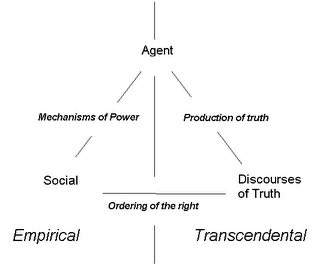Foucault's ontico-epistemic dance
[...]
Moreover for Foucault the right also plays an integral part in the process of the production of truth. As such it is impossible to take a position such that one is able to normatively decide which exertions of power are legitimate or not. He explains that we ought to think of the relation between power, right, and truth, as a triangular one, and inextricably bound up with one another.
I have tried, that is, to relate [power’s] mechanisms to two points of reference, two limits: on the one hand, to the rules of the right that provide formal delimitation of power; on the other, to the effects of truth that this power produces and transmits, and which in turn reproduce this power. Hence we have a triangle: power, right, truth (93).
[...]
Foucault’s triangle does not occur in the ether. It is intended to play out between, and be constitutive of, very real relations among men, societies, and discourses of truth. Let us begin with society. “There are manifold relations of power which permeate, characterize and constitute the social body” (Foucault, 1980, 93). Furthermore, “these relations of power cannot themselves be established, consolidated nor implemented without the production, accumulation, circulation and functioning of a discourse” (93). This discourse is invoked as an “economy of discourses of truth” (93). Thus what we have here is a society, constituted by relations of power, and organized according to the relations of an economy of discourses of truth. These economies order society according to the truth, giving legitimacy to a certain right, and the social body imposes its rule according to this right. In this respect the society renders the orderings of the right. Power permeates, but society and truth gather up unto themselves, and in relation to one another. Society manifests itself empirically as technologies and institutions, orderings and classes – truth manifests itself transcendentally as concepts, discourses, languages and signs. Now let us consider man. “We are subjected to the production of truth through power” (93). I will speak of man here as an agent. The agent feels the effects of truth. I am willing to say this is because of the way in which this truth disseminates itself in discourse and constitutes the social. The agent is subject to his or her situatedness within the broader institutional and technological complex, ordered by the right, and hence subject to its power. Furthermore, we “cannot exercise power except through the production of truth” (93). The agent exercises his or her own power through the production of truth. In this respect the agent reconstitutes the economy of discourses of truth, and to some extent the social as a result.

It is important to note that power permeates, and is constitutive of all three points of the triangle. Furthermore the various stages, and their powers occur in continuum and not at intervals. Foucault is illustrating a structure, one of which could not be conceived of without all its parts. Thus, the social, the agent, and the discourses are in some sense, one and the same – constitutive of one another. Likewise the power that permeates, in every conception is also permeated itself by the truth and the right, and visa versa. The unity of the whole lies beyond definition, but seems to allude to Spinozian like conception of nature (I think it would be exceptionally interesting to take this digression up with regards to Spinoza’s understanding of freedom and will. Could such an argument be used against accusations of determinism and objectivism in Foucault’s schematic?).
1 Comments:
surpriseingly - i understand - maybe not to the extent that you claim i will one day - but none the less
Post a Comment
<< Home